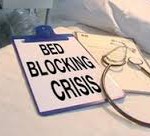NHS England list York as one of the worst communities for speedy hospital discharges
NHS England have today published data click here showing that in October 2013, the City was one of the worst communities in England for delayed transfer of care.
Of the 28 patients awaiting a move from York hospitals at the end of October, 11 were awaiting care or nursing home placements while 7 were waiting for a care in the community support package.
Both are the responsibility of the York Council to provide
Although the Council Leadership is now promising to fix the problem “within 6 months”, they have failed to explain why the developing crisis has not been mentioned in any of the reports published by members of the Labour Cabinet over the last 6 months.
The Leaders own report, being considered by the Council tomorrow (Thursday), makes no mention of the problems.
—————–

